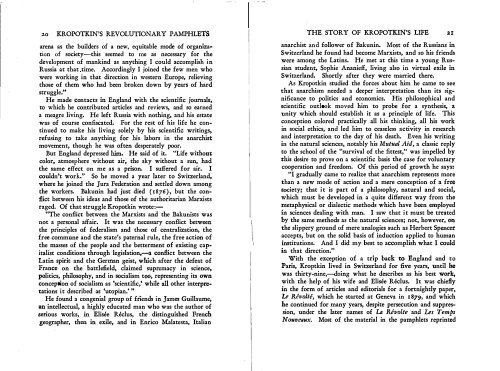Kropotkin's Revolutionary Pamphlets - Libcom
Kropotkin's Revolutionary Pamphlets - Libcom
Kropotkin's Revolutionary Pamphlets - Libcom
You also want an ePaper? Increase the reach of your titles
YUMPU automatically turns print PDFs into web optimized ePapers that Google loves.
.2.0<br />
KROPOTKIN'S REVOLUTIONARY PAMPHLETS<br />
arena as the builders of a new, equitable mode of organization<br />
of society-this seemed to me as necessary for the<br />
development of mankind as anything I could accomplish in<br />
Russia at that time. Accordingly I joined the few men who<br />
were working in that direction in western Europe, relieving<br />
those of them who had been broken down by years of hard<br />
struggle:'<br />
He made contacts in England with the scientific journals,<br />
to which he contributed articles and reviews, and so earned<br />
a meagre living. He left Russia with nothing, and his estate<br />
was of course confiscated. For the rest of his life he continued<br />
to make his living solely by his scientific writings,<br />
refusing to take anything for his labors in the anarchist<br />
movement, though he Was often desperately poor.<br />
But England depressed him. He said of it. "Life without<br />
color, atmosphere without air, the sky without a sun, had<br />
the same effect on me as a prison. I suffered for air. I<br />
couldn't work:' So he moved a year later to Switzerland.<br />
where he joined the Jura Federation and settled down among<br />
the workers. Bakunin had just died (1876), but the conflict<br />
between his ideas and those of the authoritarian Marxists<br />
raged. Of that struggle Kropotkin wrote :-<br />
"The conflict between the Marxists and the Bakurusts was<br />
not a personal affair. It was the necessary conflict between<br />
the principles of federalism and those of centralization, the<br />
free commune and the state's paternal rule, the free action of<br />
the masses of the people and the betterment of existing cap·<br />
italist conditions through legislation,--a conflict between the<br />
Latin spirit and the German geist, which after the defeat of<br />
France on the battlefield, claimed supremacy in science,<br />
politics, philosophy, and in socialism too, representing its own<br />
conception of socialism as 'scientific; while all other interpretations<br />
it described as ·utopian.' ''<br />
He found a congenial group of friends in James Guillaume,<br />
an intellectual, a highly educated man who was the author of<br />
serious works, in Elisee Reclus, the distinguished French<br />
geographer, then in exile, and in Enrico Malatesta, Italian<br />
THE STORY OF KROPOTKIN'S LIFE :n<br />
anarchist and follower of Bakunin. Most of the Russians in<br />
Switzerland he found had become Marxists, and so his friends<br />
were among the Latins. He met at this time a young Russian<br />
student, Sophie Ananieff, living also in virtual exile in<br />
Switzerland. Shortly after they were married there.<br />
As Kropotkin studied the forces about him he came to see<br />
that anarchism needed a deeper interpretation than its significance<br />
to politics and economics. His philosophical and<br />
scientific outlook moved him to probe for a synthesis, a<br />
unity which should establish it as a principle of life. This<br />
conception colored practically all his thinking, all his work<br />
in social ethics, and led him to ceaseless activity in research<br />
and interpretation to the day of his death. Even his writing<br />
in the natural sciences, notably his Mutual Aia, a classic reply<br />
to the school of the "survival of the fittest," was impelled by<br />
this desire to prove on a scientific basis the case for voluntary<br />
cooperation and freedom. Of this period of growth he says:<br />
ttl gradually came to realize that anarchism represents more<br />
than a new mode of action and a mere conception of a free<br />
society; that it is part of a philosophy, natural and social,<br />
which must be developed in a quite different way from the<br />
metaphysical or dialectic methods which have been employed<br />
in sciences dealing with man. I saw that it must be treated<br />
by the same methods as the natural sciences; not, however, on<br />
the slippery ground of mere analogies such as Herbert Spencer<br />
accepts, but on the solid basis of induction applied to human<br />
institutions. And I did my best to accomplish what I could<br />
in that direction."<br />
With the exception of a trip back to England and to<br />
Paris, Kroptkin lived in Switzerland for five years, until he<br />
was thirty-nine,---cloing what he describes as his best work,<br />
with the help of his wife and Elisee Reclus. It was chiefly<br />
in the form of articles and editorials for a fortnightly paper.<br />
Le R.evolte, which he started at Geneva in 1879, and which<br />
he continued for many years, despite persecution and suppression,<br />
under the later names of La Revolte and us Temps<br />
Nouveaux. Most of the material in the pamphlets reprinted

















